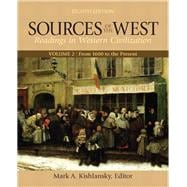
What is included with this book?
Mark Kishlansky
Mark Kishlansky is the Frank Baird, Jr. professor of history at Harvard University. He has a special interest in history of early modern Britain, focusing on the history of politics and political thought. He teaches courses on English social history, the Stuart Age, the English Revolution and the Reign of Charles I. He is a frequent participant in the sophomore tutorial program at Harvard and directs senior theses on British history. His publications include Civilization in the West (5th ed. 2002), A Monarchy Transformed, 1603-1714 (1998), Political Cultural and Cultural Politics in Early Modern England (1995), Society and Culture in World History (1994), Early Modern Europe: The Crises of Authority editor (1988), Parliamentary Selection: Social and Political Choice in Early Modern England (1986) and The Rise of the New Model Army (1979).
Preface
How to Read a Document
Part IV : The Ancien Régime
THE WARS OF RELIGION
Henry IV, The Edict of Nantes (1598)
Cardinal Richelieu, The Political Testament (1638)
Hans von Grimmelshausen, Simplicissimus (1669)
SUBJECTS AND SOVEREIGNS
James I, True Law of a Free Monarchy (1598)
Philippe Duplessis-Mornay, A Defense of Liberty Against Tyrants (1579)
Thomas Hobbes, Leviathan (1651)
John Locke, Second Treatise of Government (1689)
The English Bill of Rights, (1689)
Duc de Saint-Simon, Memoirs (1694–1723)
Napoleon Bonaparte, The Napoleonic Code (The French Civil Code) (1804)
SCIENCE AND COMMERCE
Galileo Galilei, Letter to the Grand Duchess Christina (1615)
René Descartes, Discourse on Method (1637)
Thomas Mun, England’s Treasure by Foreign Trade (1664)
David Hume, Of Commerce (1752)
Adam Smith, The Wealth of Nations (1776)
ENLIGHTENED MONARCHY
Catherine the Great, Memoirs (ca. 1755)
Maria Theresa, Testament (1749–1750)
Viscount Bolingbroke, The Idea of a Patriot King (1749)
THE ENLIGHTENMENT
Voltaire, Candide (1759)
Jean-Jacques Rousseau, The Social Contract (1762)
Montesquieu, Spirit of the Laws (1748)
Captain James Cook, Journals (1769)
Joseph Crassons de Medeuil, Notes on the French Slave Trade (1784–1785)
Thomas Jefferson, The Declaration of Independence (1776)
Cesare Beccaria, On Crimes and Punishments (1764)
Marquis de Condorcet, The Progress of the Human Mind (1793)
THE FRENCH REVOLUTION
Abbé de Sieyès, What Is the Third Estate? (1789)
The Declaration of the Rights of Man (1789) Olympe de Gouges, The Declaration of the Rights of Woman (1791)
Edmund Burke, Reflections on the Revolution in France (1790)
Maximilien Robespierre, Report on the Principles of Political Morality (1794)
Part V : The Age of Reform
INDUSTRIALIZATION IN BRITAIN
Thomas Malthus, The Iron Law of Population Growth (1798)
Samuel Smiles, Self-Help (1859)
Sir Edwin Chadwick, Inquiry into the Condition of the Poor (1842)
NINETEENTH-CENTURY SOCIETY AND CULTURE
Jane Austen, Pride and Prejudice (1813)
Henrietta-Lucy, Madame de la Tour du Pin, Memoirs (1820–1843)
Alexis Soyer, Modern Housewife (1850); Isabella Beeton, Mrs. Beeton’s Book of Household Management (1861)
Documents of the Irish Potato Famine (1845–1849)
POLITICAL CRITIQUES
J. S. Mill, On Liberty (1859)
Pierre Proudhon, What Is Property? (1840)
The Great Charter (1842)
William II, Letter to the Shogun (1844);
Bakufu, Reply to the Government of Holland (1845)
Karl Marx and Friedrich Engels, The Communist Manifesto (1848)
Alexander II and Prince Kropotkin, The Emancipation of the Serfs (1861)
Otto von Bismarck, Reflections and Reminiscences (1898); Speech to the Reichstag (1879)
Pope Leo XIII, Rerum Novarum (The Condition of Labor) (1891)
EMANCIPATING THE MIND AND THE BODY
Charles Darwin, The Descent of Man (1871)
Friedrich Nietzsche, Beyond Good and Evil (1886)
Sigmund Freud, The Interpretation of Dreams (1899)
E. Sylvia Pankhurst, History of the Suffrage Movement (1912)
THOUGHTS ON EMPIRE
J. A. Hobson, Imperialism (1902)
Cecil Rhodes, Confession of Faith (1877)
Carl Veltin, Social Life of the Swahilis (late 19th century)
Hamman Yaji, The Diary (1920)
Rudyard Kipling, ”The White Man’s Burden” (1899)
George Orwell, ”Shooting an Elephant” (1936)
Part VI : Twentieth-Century Europe
WAR AND REVOLUTION
Voices from the Battle of the Somme (1916)
Ernst Jünger, Storm of Steel (1920)
Woodrow Wilson, The Fourteen Points (1918)
V. I. Lenin, What Is to Be Done? (1902)
THE SECOND WORLD WAR
J. M. Keynes, The Economic Consequences of the Peace (1919)
Winifred Holtby, Women and a Changing Civilization (1934)
Benito Mussolini, Fascist Doctrine (1932)
Adolf Hitler, Mein Kampf (1923)
Memories of the Holocaust (1938–1945)
Winston Churchill, Speeches (1940)
Primo Levi, The Last Christmas of the War (1971)
Adolf Eichmann, Testimony (1961)
THE TWENTIETH-CENTURY IMAGINATION
Virginia Woolf, A Room of One’s Own (1929)
Alexander Solzhenitsyn, One Day in the Life of Ivan Denisovich (1962)
Jean-Paul Sartre, Existentialism (1946)
Simone de Beauvoir, The Second Sex (1949)
THE TRANSFORMATION OF EASTERN EUROPE
Winston Churchill, ”The Iron Curtain” (1946)
Nikita Khrushchev, Report to the Communist Party Congress (1961)
Mikhail Gorbachev, Perestroika (1987)
Francis Fukuyama, The End of History? (1989)
TOWARD A NEW WORLD
Charter of the United Nations (1946)
The Charter of Economic Rights and Duties of States (1974)
Kofi Annan, Report on the Fall of Srebrenica (1999)
Acknowledgments
The New copy of this book will include any supplemental materials advertised. Please check the title of the book to determine if it should include any access cards, study guides, lab manuals, CDs, etc.
The Used, Rental and eBook copies of this book are not guaranteed to include any supplemental materials. Typically, only the book itself is included. This is true even if the title states it includes any access cards, study guides, lab manuals, CDs, etc.